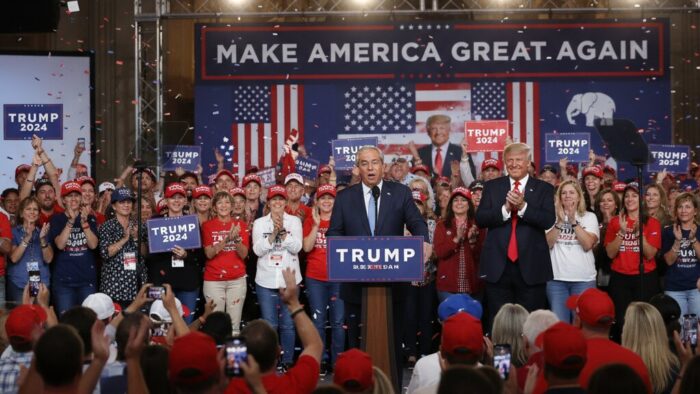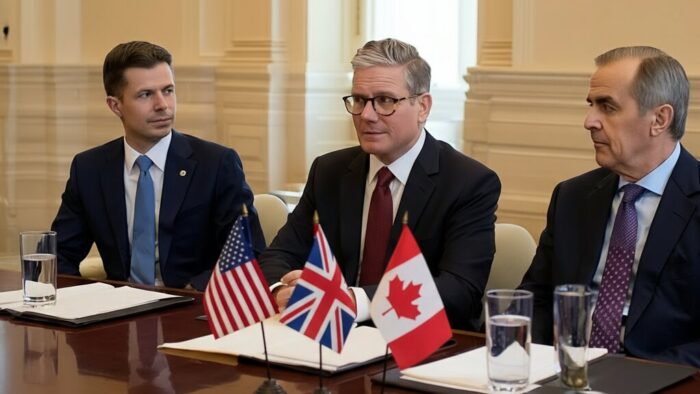Britain’s Conservative Party, once boasting they were the world’s most successful political party, is embracing Donald Trump-style policies including mass deportations and government budget-slashing as it battles to remain a contender for power against Nigel Farage’s Reform UK. On 8 October 2025, the Associated Press reported that the center-right party that governed the United Kingdom for more than 60 of the last 100 years is fighting not just the Labour government to their left, but Reform UK to the right, which has topped opinion polls for months. The article begins:
Britain’s Conservatives used to boast they were the world’s most successful political party. Not anymore. The center-right party that governed the U.K. for more than 60 of the last 100 years before being ousted in 2024 is embracing Donald Trump-style policies, including mass deportations and government budget-slashing, as it battles to remain a contender for power. The Tories are fighting not just the Labour government to their left, but Reform UK to the right. Nigel Farage’s hard-right party has topped opinion polls for months, trounced the Conservatives in May’s local elections and has welcomed a stream of defecting Tory members and officials. Conservative leader Kemi Badenoch acknowledged that the party has “a mountain to climb” to win back voters.
Key Points
- Conservative leader Kemi Badenoch announced policies with a distinct MAGA flavor, including scrapping carbon emissions reduction targets, sharply cutting legal immigration, and deporting 150,000 unauthorized immigrants annually with a removals force similar to US Immigration and Customs Enforcement.
- Nigel Farage’s hard-right Reform UK party has topped opinion polls for months, trounced the Conservatives in May’s local elections, and has welcomed a stream of defecting Tory members and officials.
- Conservative lawmaker Robert Jenrick, who lost the 2024 leadership contest to Badenoch, has spent the ensuing months building his online brand and has become one of the party’s loudest anti-immigration voices.
- Badenoch’s poor poll ratings and lackluster performance in Parliament have stirred speculation that she may be ousted long before the next election, which does not have to be called until 2029.
Nigel Farage, Reform UK, and the Global National Conservative Alliance: Britain’s Role in Transnational Right-Wing Populism
National conservatism has emerged as a transformative force in British politics through Reform UK leader Nigel Farage, who embeds himself within transatlantic networks extending from Washington to Budapest as a bridge between Britain’s populist currents and the broader Global National Conservative Alliance. Reform UK holds a double-digit lead over Labour in polls, threatening Britain’s traditional two-party system as rising right-wing populists capitalize on economic and migration crises while centrist leaders lose ground ahead of the 2029 elections.
The party’s economic platform demonstrates the broader European trend of right-wing populists adopting left-wing economic policies to broaden working-class appeal. Reform UK pledged to raise state spending by £53 billion annually while cutting taxes, practicing what analysts term “welfare chauvinism” by supporting generous benefits for citizens while excluding migrants. This approach reflects the Global National Conservative Alliance’s shift away from Reagan-era free markets toward nationalist protectionist policies that prioritize national sovereignty over global economic integration.
Farage’s role extends beyond domestic politics into international conservative networks, demonstrated when he mourned Charlie Kirk as “my friend” before the House of Commons following the American activist’s assassination. This relationship exemplifies how Kirk allied with figures like Farage and Viktor Orbán, echoing their critiques of globalism and liberal cultural norms. Beyond symbolic gestures, Farage maintains frequent speaking engagements at U.S. right-wing events that reflect durable cross-border cooperation among populist radical networks.
The movement’s ideological positioning has raised concerns about foreign influence operations, particularly regarding Russia. Belgian politician Guy Verhofstadt charged that Farage defended Vladimir Putin “all the time” during his European Parliament tenure, while Labour MP Chris Bryant alleged substantial payments from Russian state-backed media RT. These connections gained scrutiny when Farage made 17 documented appearances on Russia Today between 2010 and 2014, during which he offered no criticism of Russian democracy and claimed he remained uncertain whether Assad had used chemical weapons in Syria.
Farage’s integration into the Global National Conservative Alliance became explicit through his appearances at CPAC conferences alongside Orbán, Marine Le Pen, and Javier Milei, where he joined fellow travelers promoting shared nationalist ideology. His March 2025 trip to headline a $500-per-head Republican fundraiser for Donald Trump in Florida violated UK parliamentary transparency rules, drawing criticism over foreign influence concerns and domestic accountability questions. This transatlantic coordination reflects how center-left governments face unprecedented challenges from anti-immigration parties that have achieved electoral momentum across Europe’s three biggest economies.
External References:
— Could Trump’s Election Bolster Reform UK’s Momentum? — IPR Blog
— With Friends Like These: Nigel Farage’s Year of Speaking at Radical Right-Wing Groups — DeSmog
— Europe’s Populist Right Veers Left on Economics — Wall Street Journal
The Global Influence Operations Report (GIOR) utilizes AI throughout the posting process, including the generation of summaries for news items, introductions, key points, and, often, the “context” section. We recommend verifying all information before use. Additionally, all images are generated using AI and are intended solely for illustrative purposes. While they represent the events or individuals discussed, they should not be interpreted as real-world photography.










